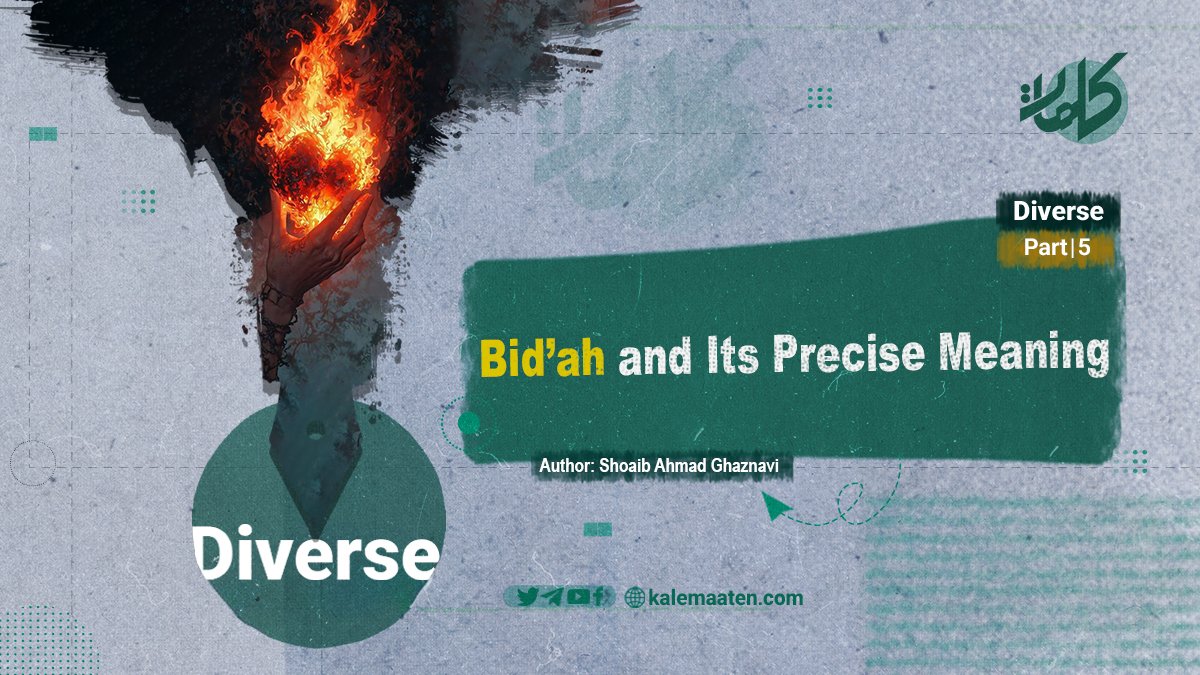
Author: Shoaib Ahmad Ghaznavi
Bid’ah and Its Precise Meaning (Part 5)
9. Imam Qarafi (MABH):
It is narrated in section 252 of the book “Al-Isaf Bil Talab, a brief explanation of the selected method based on the rules of the school of thought” by Allamah Ahmad bin Ali Manjur, which is related to Maliki jurisprudence, that Imam Qarafi says: “As far as I have seen and read, the companions are unanimous in rejecting Bid’ah, and Ibn Zayd and others have specified and defined it. The detail of the matter is that Bid’ah is of five types:
1. Wajeb (Obligatory) Bid’ah: It concerns obligatory Sharia laws, such as compiling and collecting the Quran and Sunnah whenever there is a fear that they will be lost; conveying the religion of Allah to future generations is unanimously obligatory, and neglecting it is forbidden. In such cases, it is not appropriate for us to disagree about its necessity.
2. Haram (Forbidden) Bid’ah: This type is carried out under principles and rules of Sharia that are prohibited, such as customs and other oppressions that have become common, and newly emerging matters that contradict the principles of Sharia. An example would be giving precedence to the ignorant over scholars and entrusting Sharia responsibilities—through inheritance—to someone who is unqualified merely because their father held that position while they themselves lack the necessary qualifications.
3. Mustahab (Recommended) Bid’ah: This type is carried out under the rules of Sharia that are recommended, such as congregational prayers during Taraweeh and creating suitable and worthy status for judges and governors. This contrasts with the way of the Companions (may Allah be pleased with them), who were simple and unblemished, as today the interests and goals of Sharia (which are societal interests) can only be realized through the status of officials in the eyes of the people.
4. Makruh (Disliked) Bid’ah: This type encompasses actions that are disliked in Sharia, such as dedicating certain days as particularly good or blessed for acts of worship (or occasions like weddings, shopping, etc.).
5. Mubah (Permissible) Bid’ah: This type is executed under rules that are permissible in Sharia, such as making and using sieves for flour. It is stated in narrations that the first thing people made after the Messenger of Allah (PBUH) was a sieve. Since improving life and making it better is permissible, providing the means and accessories for improvement is also permissible. Considering what has been stated, it can be understood that not everything classified as Bid’ah (just because it is a Bid’ah) leads to misguidance; many types of innovations that adhere to the principles and rules of Sharia do not result in misguidance or error. Therefore, the term Bid’ah for them is a lexical term, not a religious one. Religious Bid’ah refers specifically to that which is forbidden and abhorrent and does not occur under the general principles and rules of Islamic law.
Some General Principles of Islam:
1. «لا ضَررَ و لا ضِرارَ» Translation: “Harming oneself and others is not permissible in Islam.” This rule prohibits any new and innovative thing that causes harm to oneself or others, even if there is no explicit ruling on it in the Quran or Sunnah.
2. «وَ أفْعلوا الخيرَ لَعَلَّكُم تفْلِحُون» Translation: “Do good, that you may be saved.” This law commands doing whatever is good and virtuous, provided that it does not conflict with what the Holy Lawgiver has expressly forbidden or does not create future corruption.
3. «الضرورات تُبيحُ المَحْظورات» Translation: “Necessity makes the forbidden permissible.” Therefore, whatever is forbidden becomes permissible in a state of necessity, as necessity has its own rules. However, it is permissible to do a permissible thing only to the extent necessary and not beyond that. Necessity also includes situations where the health of a person or animal or a part of a person or animal depends on the action, so that failure to act may lead to death, disability, chronic disease, or delayed treatment.
4. «إذا تَعارَضَ الحلال والحرامُ في أمرٍ رُبِّحَ الحرام احتياطاً» Translation: “Whenever there is a conflict between what is lawful and what is forbidden, it is preferable to do what is forbidden, as a matter of precaution.”
5. «ما حُرِمَ أخْذُهُ حُرِمَ إعطاؤه» Translation: “Whatever is forbidden to own and possess is also forbidden to give away.” This includes items such as pork and wine.
6. «البَيَّنَةُ على مَن ادَّعى واليَمينُ على مَن أَنْكَرَ» Translation: “The plaintiff must have witnesses, and the defendant must take an oath” when sufficient evidence is not available.
7. «الأمورُ بمقاصِدِها و الأعمال بالنيّاتِ» Translation: “Works depend on goals and objectives; actions depend on human intention and intention.” The value of everyone’s work and actions depends on their goals and intentions.
8. «إعْمالُ الكلامِ أَوْلَى مِنْ إهمالِهِ» Translation: “Acting on the content of a word is better than canceling it and rendering it ineffective.”
A group of scholars and jurists has written treatises and books on the rules of Islam, including Izz al-Din Abdul Salam, Ibn Rajab al-Hanbali, Ibn Laham, Ala’i, Suyuti, Ibn Najim, the author of the book “Al-Ishbah wa al-Naza’ir,” and others. These principles and rules reflect the breadth and comprehensiveness of Islamic law, ensuring that no event occurring until the end of the world will be without the law’s ability to issue rulings on obligatory, forbidden, disliked, and permissible actions based on these comprehensive rules, even if the texts (the Quran and Sunnah) may be insufficient and concise in addressing such events. These are principles inferred from Quranic verses and the Sunnah of the Prophet (PBUH).
Continues…


